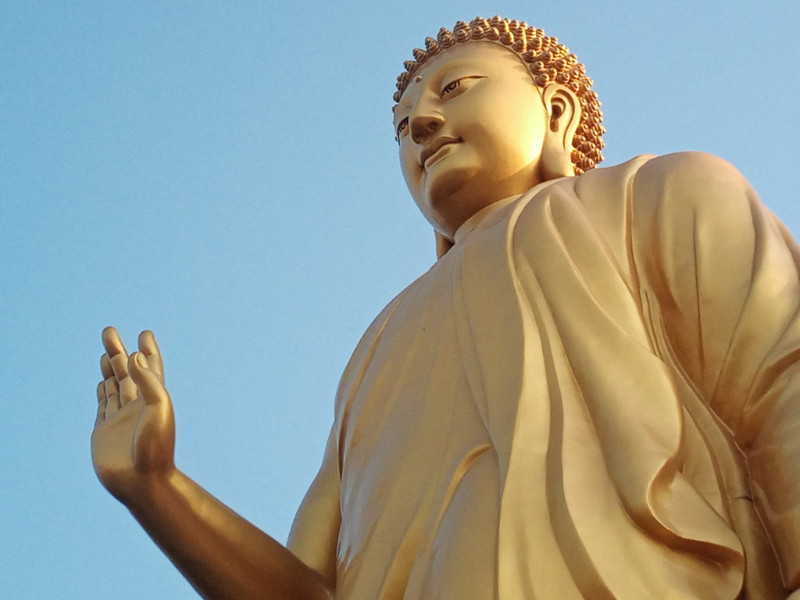Vision & Transformation
The Triratna International Council : Nagaloka, February 2025
Introduction
Some of you will not be familiar with the International Council. It was established in 2011 with Bhante’s blessing as a way of ‘joining up’ Triratna across the many geographical regions that we have so far reached. It brings together people around the world taking responsibility within the three Strands (College, Order and Movement) to facilitate collaboration and unity. More information about the International Council here.
Many of us in the International Council arrived at Nagaloka in Nagpur after attending the wonderful International Order Convention at Bodhgaya. Nagaloka felt like an oasis and a beautifully peaceful place to gather.
So what did we do with our 8 full days together?
The following summary provides an overview of our meeting and the provisional agreements we reached.
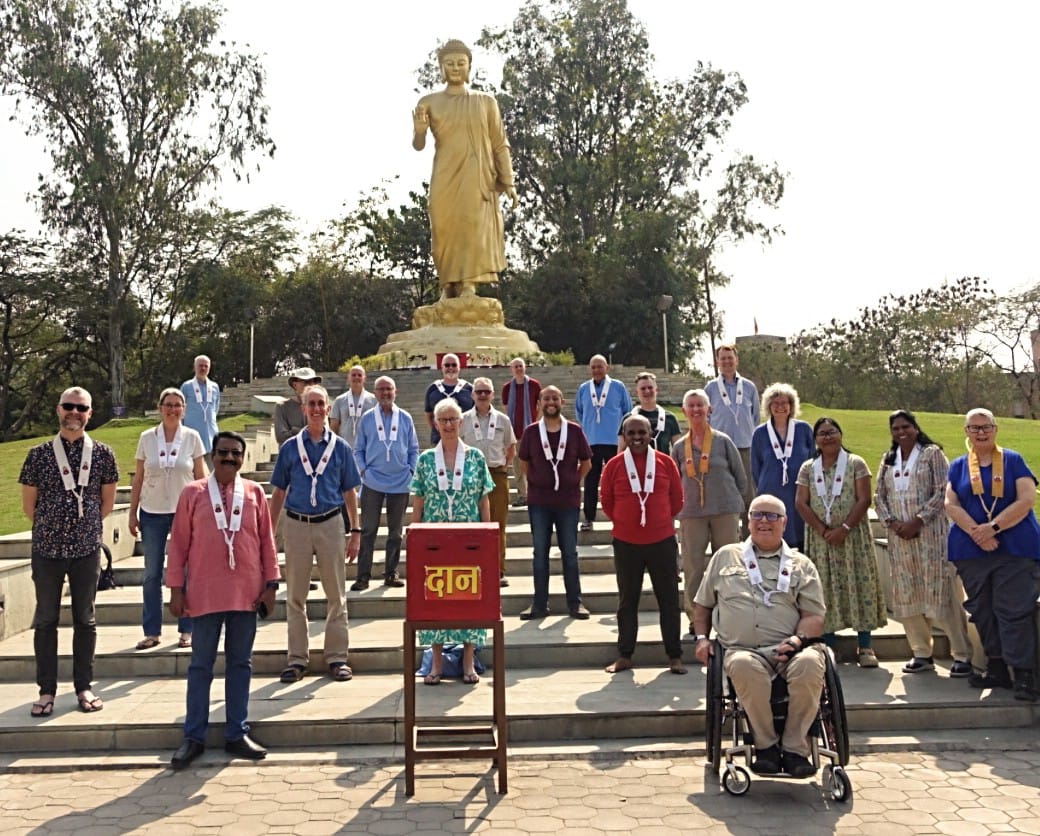
At our previous in-person meeting at Adhisthana (November 2022), we successfully reviewed the International Council’s (IC) purpose, established its priorities, and updated its working arrangements. At subsequent online meetings we explored some of these priorities, but struggled to translate them into concrete actions.
In November, Mahamati succeeded Ratnadharini as chair. A key figure in the IC’s founding in 2011, he has a deep understanding of its crucial role in fostering cohesion and unity within our international movement. Prior to our meeting at Nagaloka, he clearly stated his desire to introduce himself and his vision to the IC. He also wanted this gathering to be enjoyable and to achieve tangible outcomes, ideally without excessive reliance on flipcharts!
Nagaloka (in Nagpur, central India) provides intensive, residential Dharma and social empowerment training programs for young men and women from different states across India. On our first evening, Maitreyanath, the Director of Nagaloka, led us on a comprehensive tour of the well-maintained 15-acre campus. At its heart stands a striking 11-meter tall golden walking Buddha. Directly facing him, in the distance, is an elevated bronze statue of Dr. Ambedkar.
This setting was ideal for our meeting’s theme of Vision and Transformation.
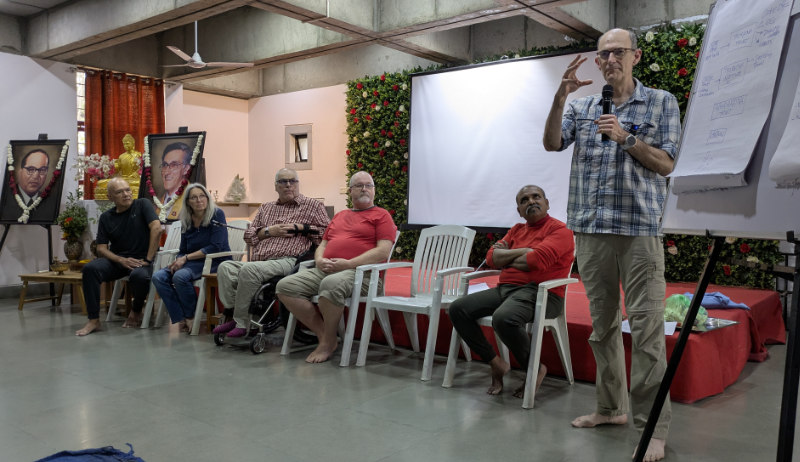
(we did have some flip-charts, sorry)
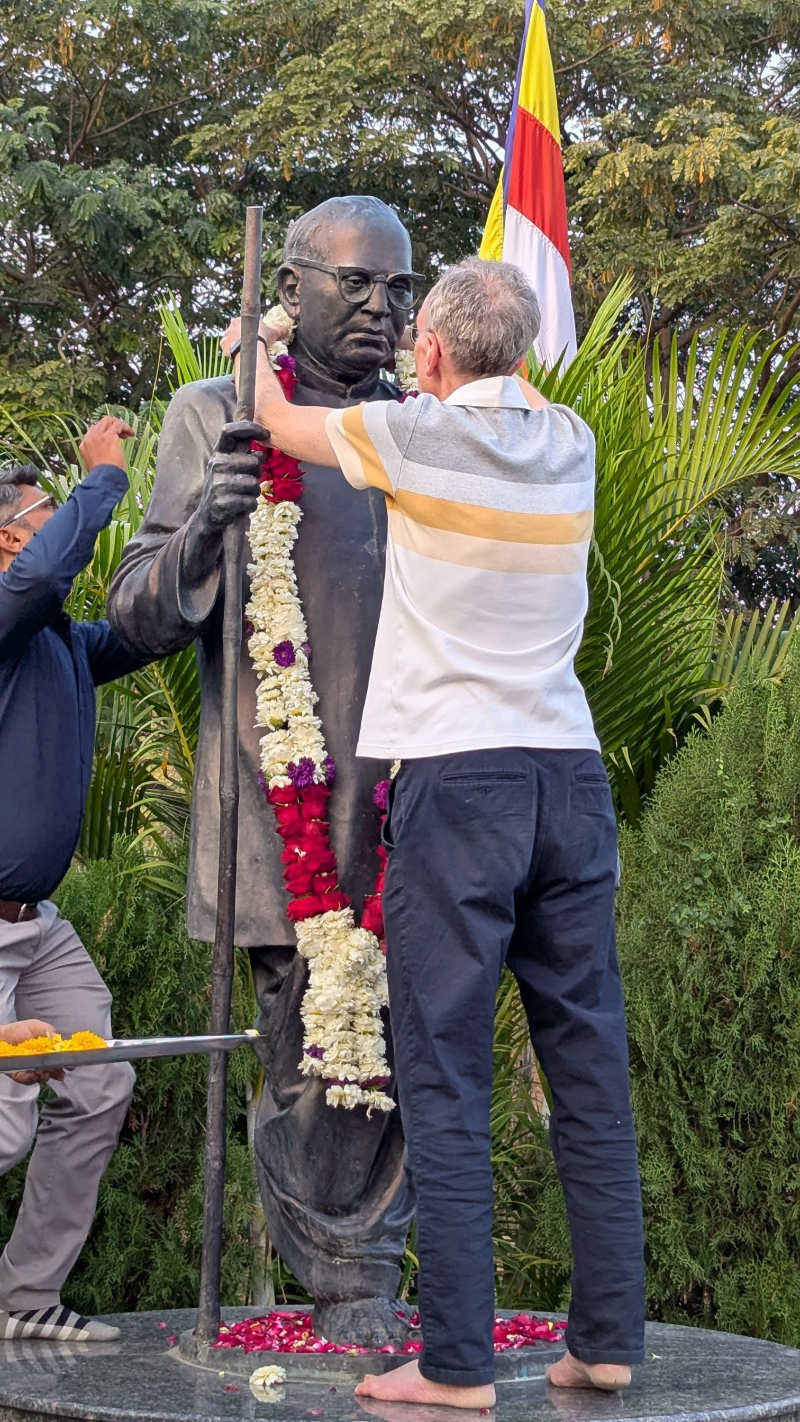
Overview
Each morning began with meditation in an airy ten-pillared shrine room, designed to resemble a verdant cave.
After breakfast, to commemorate Bhante’s birth centenary, we heard concise presentations on chosen aphorisms and brief excerpts from his writing which we then studied in chapters.
Parami spoke about...
To me, it seems more obvious than ever that if we are to generate enough enthusiasm and inspiration to enable us to break through the bonds of our own individualism, as well as through the strongly anti-spiritual tendencies of modern life itself, we need the Bodhisattva Ideal. Only the Bodhisattva Ideal can carry us beyond ourselves and the world – and back again into them on a totally different basis. (Correspondence)
Amogharatna spoke about...
You can only lead a simple life if you remember what life is really for. The purpose of simplicity is not to let the business of living get in the way of the things that are of importance. (Seminar on ‘The Door Of Liberation) (See also: What we need is more and more of less and less)
Abhayadana spoke about...
The Dharma cannot be taught; it can only be caught. You have to catch the spirit of religion, and you do that through the influence of other people. (Buddhism and Education. Lecture)
Jnanacandra spoke about...
Speaking personally, I do not want disciples who are meek and obedient and afraid to speak their mind. I want disciples who are bold, self-confident, and independent and who are capable of standing against the whole world if necessary. (Correspondence)
Vajrashura spoke about...
The good is very often the enemy of the best. (Seminar on The Stability of Societies)
Jnanadhara spoke about...
Formerly, one needed courage to attack institutions. Now one needs courage to defend them – and still more courage to create them. (Aphorism)
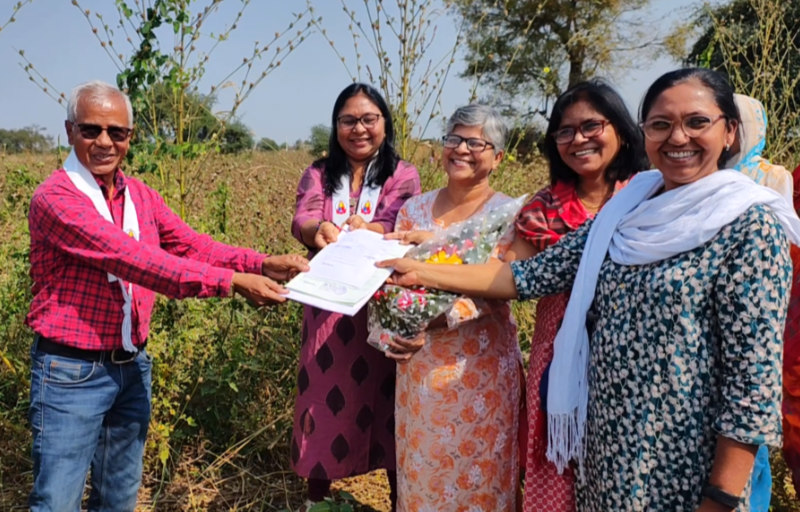
Dhammachari Nagabhadra ritually hands over the land deeds for women’s retreat centre
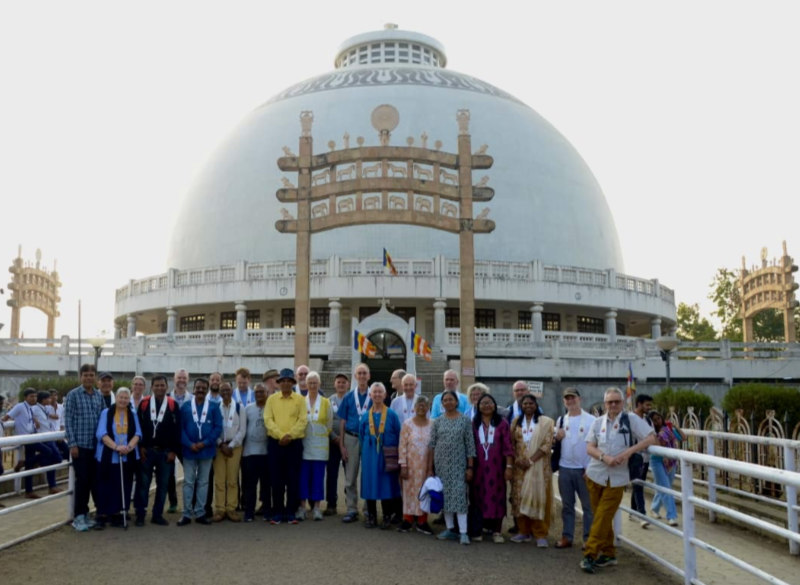
IC at the Deekshabhumi
On the first full day of the meeting, Arthavadin provided an overview of the IC’s activities since 2021 and Mahamati presented his thoughts on the importance of the IC, its future trajectory, and its potentially synergistic relationship with the newly formed College Chairs Council.
Most days, we focused on exploring key IC strategic priorities and determining action steps.
We also heard from Candradasa and Dayaketu about the future of the Dharma online in light of new technologies (which had been specifically requested by the IC membership), and about Future Dharma’s ‘Work A Day For The Dharma’ initiative presented by Nandavajra. Finally, there were opportunities for Strands and (where possible) Area Councils to meet.
In the evenings, we either participated in puja or enjoyed Maitreyanath and Amrutdeep being interviewed.
Towards the end of our time together, we enjoyed an inspiring day visiting:
- Deekshabhumi, where Dr. Ambedkar and approximately 400,000 followers converted to Buddhism on October 14, 1956
- a site in the country intended for a new women’s retreat centre
- and Sudarshanabhumi, a beautiful new retreat centre, where we enjoyed a delicious lunch
Also, Amoghavajra hosted a cultural evening filled with entertaining, talented, and surprising performances.
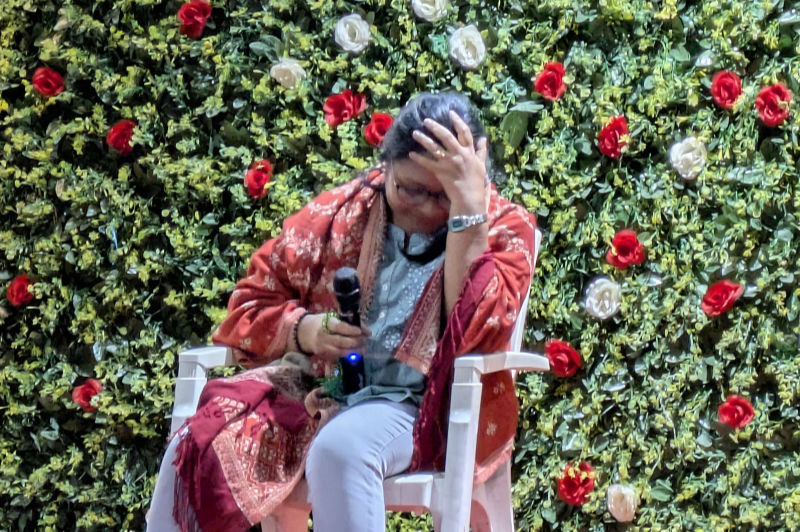
Abhayadana being dramatic! (as part of the cultural evening)
Discussions and actions
IC Strategic Priority 1:
The Path of Responsibility
At our April 2023 online meeting we explored how to deepen the spiritual experience of the Path of Responsibility. At that meeting, the IC generated seventeen insightful ideas, which were subsequently prioritised for their potential impact. The top-ranked suggestion was to revitalise the New Society as a compelling and relevant vision to inspire those taking, and thinking about taking, responsibility within Triratna – both now and in the future. Recognising that the New Society had been a recurring theme at previous IC gatherings, but never formally explored, it was agreed that it would be helpful to give it focused attention.
Recently appointed College Deputy Vajrashura delivered a thought-provoking presentation to introduce the New Society theme. His central message was that the New Society remains a clear and relevant vision for Triratna but we need to find new and different ways to realise it. He proposes that the New Society should provide contexts of daily transformative intensity, beyond what are currently available. Vajrashura concluded by inviting the Strands to consider practical ways of acheiving this.
IC Strategic Priority 1 (sub-element):
Decision-making
In September 2023, the International Council (IC) met online to establish principles for decision-making and to explore a universal decision-making model for Triratna. While the meeting produced valuable information, the aspiration of a universal model proved overly ambitious.
Recognising the IC’s lack of a clear decision-making model, Bodhivamsa was tasked with developing a proposal for the IC at Nagaloka.
This was discussed, revised and accepted as a recommendation which will be forwarded to Area Councils for consent. If agreed, the decision-making process will be formally incorporated into the IC’s working arrangements and shared as a suggested model for other bodies.
The video provides an overview – which will be further refined – of the recommendation that will be sent to all Areas Councils for consent.
IC Strategic Priority 2:
Develop effective communications
The September 2023 IC online meeting started exploring Triratna’s communications, specifically how to effectively communicate Triratna to the world. The membership was clear about what it wanted to communicate and how it wanted this to happen. However, it also recognised that communications covers such a broad spectrum of activities and that these needed to be prioritised.
Candradasa and Dayaketu first offered an introduction to AI (artificial intelligence) and Algorithms, including an example of how the quality of Bhante’s lectures can be improved using AI.
They then gave a comprehensive presentation of how the Buddhist Centre Online is meeting a wide range of Triratna’s online communications (and other) needs, as well as laying out the pressing financial challenges that threaten its continuing operation and future development.
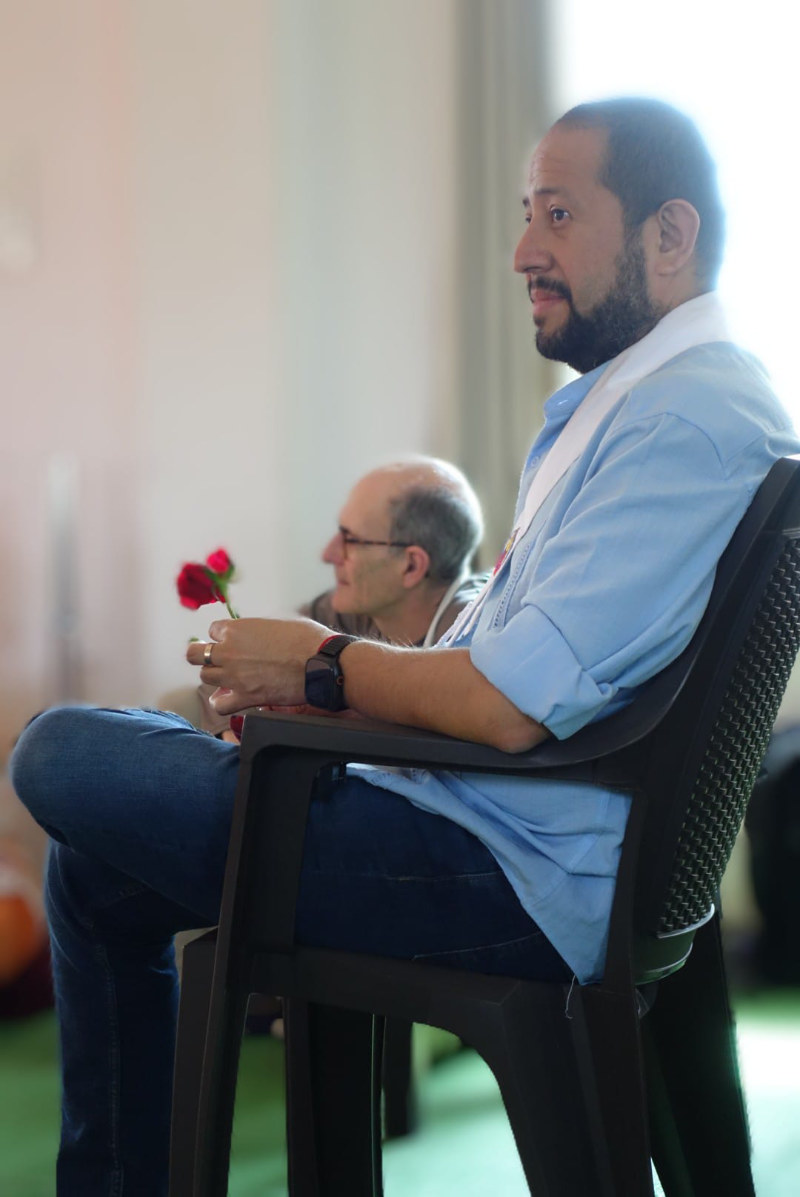
Dayaketu (having a break from all the video work)
In addition to the above, Arthavadin facilitated a communications prioritisation exercise where the membership identified the following four issues as the most important:
- identify who or what should take the lead on Triratna’s communications
- establish clarity and consistency around key messages that we want to communicate about Triratna
- establish sustainable funding for TBCO
- establish effective means of translating important internal and external communications into Spanish and Hindi (as well as English)
The Steering Group agreed to address these priorities and will feed back to the IC on progress later this year.
IC Strategic Priority 4:
Wealth creation and management
Wealth creation and management is the IC’s fourth strategic priority. It aims to generate, liberate, and invest financial resources to fund Triratna’s essential institutions.
Nandavajra, Director of FutureDharma, was invited to help the IC explore this priority. There was no expectation that this would result in definite actions although, as can be seen below, some were generated.
Nandavajra gave a brief presentation which included the sharing of an unofficial diagram which helpfully illustrates the organisational flow of funds within and across Triratna.
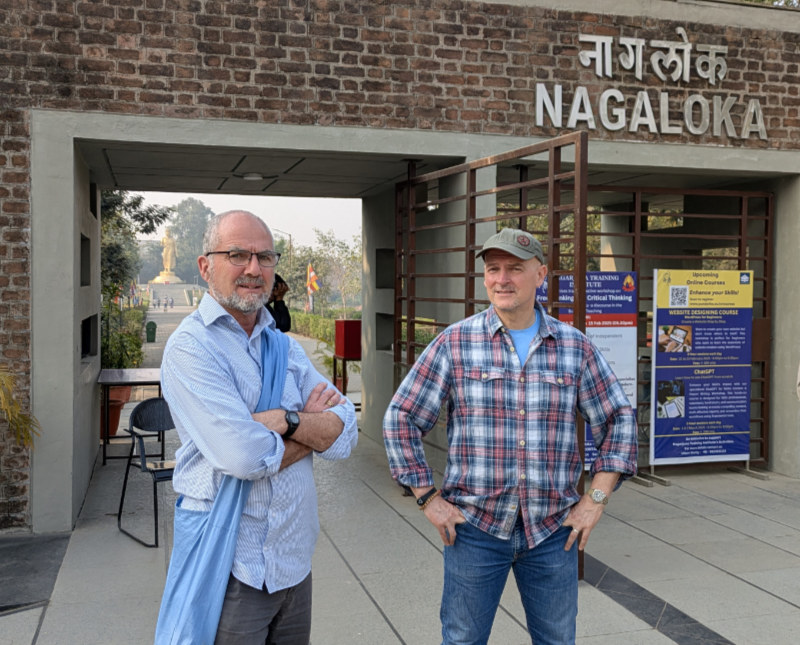
Nandavajra and Arthavadin
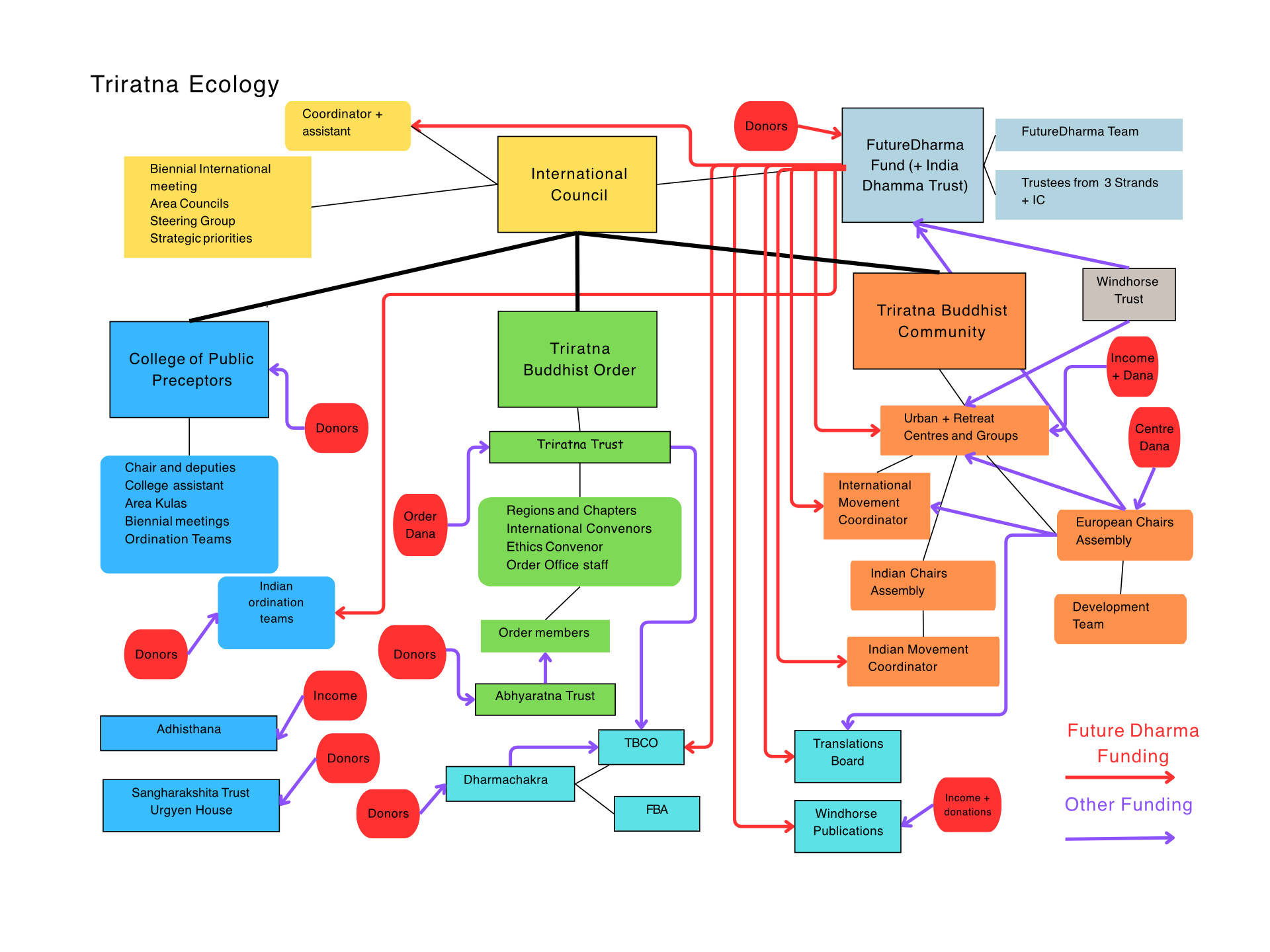
He then invited the IC membership to consider these questions:
- What are the key financial issues/needs for our institutions?
- What can be done to address them?
Responses to these questions below:
Funding issues to be addressed
• do we have a vision that is so compelling that people want to give financially to support and realise it?
• serving our institutions needs to be integral to our vision
• we are not thinking big enough about how to generate sources of revenue
• have we explored the potential of untapped possibilities – eg. grant funding?
• pros and cons of centralised/decentralised fundraising
• reluctance to be bold around money
• we need to find ways to develop a greater sense of urgency around this issue
• (India) lack of proper systems around funding for the institutions
• (India) loss of FCRA is negatively impacting the funding of institutions
• (India) most Order members do not take responsibility within the institutions after ordination which burdens the minority who do
Potential Actions
• look externally to how other religious and spiritual movements have created ethical income streams
• harness ‘best practices’ around fundraising and roll out to all Areas
• educate newcomers, mitras, GFR mitras, Order members around the altruistic dimension of GFR, culture of giving, increase understanding about importance of funding our institutions and how
• develop an inspiring vision that people want to support financially – a vision that gives people a sense of joining and being part of something bigger than themselves. IC could devote more time and attention to this. Alternatively, draw together key stakeholders and ‘multipliers’ and ‘influencers’ into a working group (ensure internationally aware and not UK-centric)
• research says that spiritual communities thrive when there is a high level of participation by all. Find ways to encourage this
• encourage the development of bold projects that have the potential to become ‘cash cows’ – possibly at least one in each Area
• seek crowd funding to invest in projects rather than relying solely on dana
• request FutureDharma to review the extent to which the centralisation of fundraising is working and explore with the IC
• (India) discuss the creation of proper systems to fund/finance the institutions
• (India) develop training for the Order to encourage the taking of institutional responsibility after ordination. The Indian College and Order will work together to achieve this
IC Priority 8: Dharmic engagement with social and ecological issues
Arthavadin fed back to the membership that after a long, and at times challenging, process the ‘Guidelines on Buddhist Social Action’ have now received consent from all six Area Councils. The Steering Group is keen that after so much hard work these guidelines are discussed and explored within Areas and Strands so that they are widely known and brought to life as a helpful resource. We expect that this resource will be shared with the Order in the next few months.
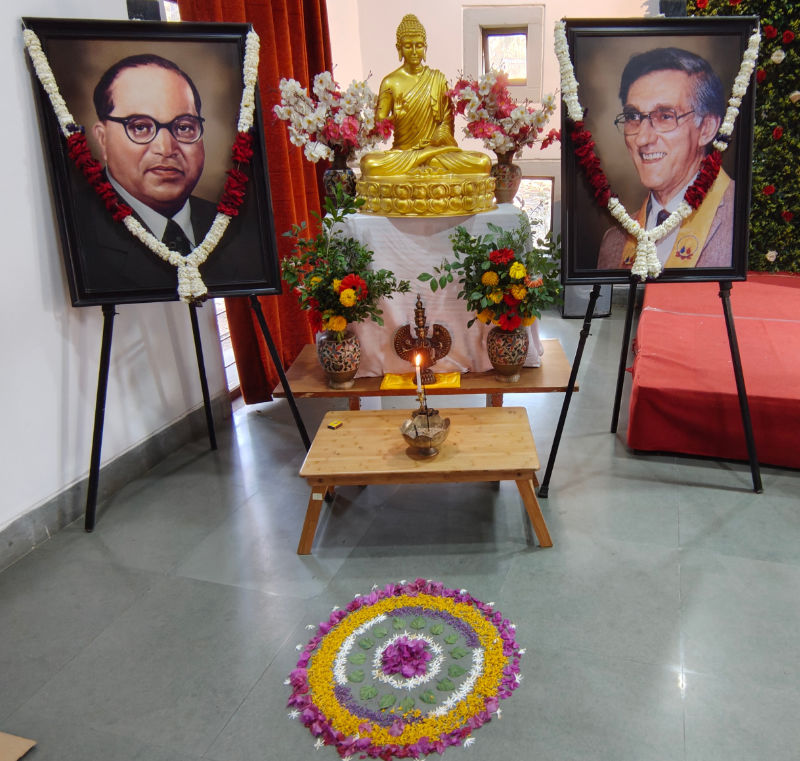
Conclusion
The International Council’s meeting at Nagaloka began to successfully bridge the gap between strategic aspirations and practical actions. It fostered invaluable in-person connections and reinforced the kalyana mitrata that unites us despite living and working in different parts of the world.
Significant strides were made in clarifying the IC’s decision-making process, and in addressing Triratna’s communications. Notably, the meeting reignited the vision of the New Society, prompting insightful discussions and concrete actions across the College, Order, and Movement Strands. Furthermore, we began to delve into the crucial area of wealth creation and management, planting seeds that will hopefully sprout into initiatives that secure the financial sustainability of our key structures and institutions.
Beyond the specific agreements and action plans, the meeting’s success lay in its ability to inspire. The rich tapestry of experiences gained from spending ten days in close proximity – meditating, practicing and eating together; exploring Bhante’s aphorisms and, and simply enjoying a day out, and entertaining each other at our cultural evening—created a shared context for meaningful dialogue. Although we have now returned to our respective homes, we carry with us a renewed sense of purpose. By translating collective aspirations into tangible actions, and by nurturing the bonds of spiritual friendship, each and every member has played a small but important part in maintaining and strengthening the IC, and therefore Triratna. Thank you.
